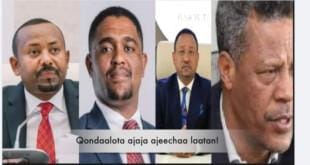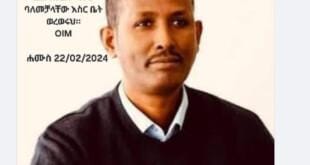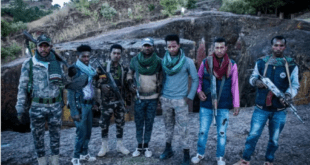Abiy Ahmed, Micheal H. Raynor, Isayas Afeworki and an assortment of unitarist Ethiopian elites are teaming up to dismantle Oromo nationalism in order to build the Ethiopian state at the expense of the Oromo nation. It is a project that was initiated before Abiy came to power, when it became obvious that the Tigray People’s Liberation Front (TPLF) had lost its grips on power to the historic Qeerroo revolution of 2014 to 2018. These actors have different motivations and priorities, but they all seem to have a converging interest in derailing the Oromo Protests of 2014 – 2018 from reaching its intended targets.
Many didn’t take the prime minister seriously when he asserted – shortly after he assumed power – that he would be assassinated if he visited Wollega, making the bogus claim that the Oromo from other regions would want to avenge his death if he were assassinated, and that would be the end of a unified Oromo nation. Considering the mounting evidence that reveal his disturbing disposition towards the Oromo quest for freedom and democracy, there aren’t many who doubt that he was vocalizing – perhaps subconsciously – his intentions to divide and weaken the Oromo nation, when he made those contemptible statements. It was a Freudian slip that revealed his true feelings about Oromo nationalism, which he has repeatedly and publicly blamed – without offering any evidence – for diminishing the Oromo nation.
‘What keeps him up at night’ (to use the expression of one of his highly-placed deputies) is the rise of Oromo nationalism, and he is doing everything within his power to dismantle it. He is right that the rise of Oromo nationalism poses a threat to the version of Ethiopia he is trying to impose on the population, thus he is attempting to destroy it at its fountain. That is why he launched another massive military offensive in Western Oromia recently, trying to put down the Oromo Liberation Army (OLA) that is based in the region. He appears to have decided that the Oromo from Wollega and Guji must be punished en masse, because they have valiantly resisted his imperial vision of the country.
Based on how often he mentions it, he must have taken his mother’s wish that he would be ‘the seventh King of Ethiopia’ a bit too seriously, revealing a frightening level of delusional grandeur he could be harboring. He is exhibiting a deep-seated personality disorder which is largely responsible for the type of misery visited upon the residents of Western and Southern Oromia today. Despite the ‘peace prize’ he was given in Oslo courtesy of the global power brokers, he fits right in with some of his odious predecessors who suffered from the same type of personality disorder.
Abiy also seems to have learned a thing or two from the previous rulers of the country on how to conduct ‘foreign policy’ in order to keep the Oromo down. It is common knowledge in certain circles that the current US ambassador to Ethiopia, Michael Raynor, is the chief enabler and sponsor of the prime minister’s ill-considered policies. There are compelling evidences indicating that the Ambassador is one of the key figures egging Abiy on to take actions against the interests of the Oromo nation. Mr. Raynor (and by extension the US foreign policy establishment) must have doubts that the Oromo people and other Ethiopians are capable of self-government, and this appears to have created a big opportunity for the novice prime minister to fulfill his obscene ambition to be the uncontested king of the Amhara-dominated Ethiopia. Reliable sources indicate that Western diplomats like Mr. Raynor see the prime minister as, justifiably, a second-rate intellect with enormous ambition, as someone who can be directed and manipulated at will.
The prime minister has also found a soulmate and perhaps a tutor in Isayas Afeworki of Eritrea in how to break the spirit of a nation. Many Oromo political leaders and academics have always sympathized with the legitimate cause of Eritreans, both before and after their independence. Yet, with the exceptions of a few Eritrean scholars and public figures, Isayas Afeworki and a significant number of Eritrean elites (both in government and the opposition) have never genuinely supported the Oromo struggle for freedom, for reasons that ought to be a subject of future academic inquiry. It is a strange phenomenon that these Eritreans’ vision of Ethiopia is informed by the Amhara-centric view, and though their country hosted the Oromo Liberation Front for its own purposes for many years – tightly ‘controlling’ its movements – it is now clear that the Eritrean regime perceives the rise of Oromo nationalism to be an unwelcome development that must be confronted and contained.
Paradoxically, the slight opening that Eritrea now enjoys with the rest of the world was largely made possible by the Oromo-protest movement in which thousands of Oromo youth sacrificed their lives and limbs. Lest one forget, it was the substantial military and political support that the Isayas administration offered the Zenawi-led Ethiopian regime that pushed the Oromo Liberation Front out of the Ethiopian political scene in the early 1990’s. However, no serious Eritrean thinker or politician has publicly reflected on the legitimate case that can be made that both the Oromo and Eritrean populations would have been significantly better-off, had Isayas played a more balanced role in Ethiopian affairs in those days. Unfortunately, the EPLF is repeating a similar mistake, and is working overtime to derail the Oromo march for freedom and fair political representation in the country.
It is also no secret that Abiy is constantly conferring with an assortment of unitarist Ethiopian academics and politicians on how to systematically dismantle the existing multi-national federation, under the pretext that it poses a mortal threat to the Ethiopian state. We can be sure that any tinkering with Ethiopia’s present constitution in a regressive manner will lead to the worst-case scenario by facilitating a disorderly and bloody disintegration of the country ; yet the so-called Ethiopian intellectuals have made it their key political agenda, and they have found a partner in the prime minister to achieve that. The leaders of the inaptly named Ethiopian Citizens for Social Justice Party could not contain their excitement when they disclosed in certain public forums that Abiy is doing a fantastic job of diminishing Oromo nationalism and promoting their version of Ethiopia which has been oppressive to millions.
This writer is under no illusion that the individuals who have been the subjects of this short piece will suddenly recognize the errors of their ways and start implementing policies that might ensure peace and stability in the Horn of Africa. Most of them are brutes who have never been held to account for their significant misdeeds in the past, and they are not about to start caring for the potential consequences of their costly adventures. I’m writing these notes mostly for history’s sake, so it shall be documented who the responsible key characters are for ushering in the looming bloody strife in the highly volatile region. But, if they truly care about avoiding the impending disaster and salvaging what is left of their reputation in the eyes of the Oromo people, they will carry out the following steps sooner than later.
- Abiy can help, first and foremost, by stopping the undeclared war he is currently waging in Wollega and Guji, removing all military personnel from these zones effective immediately. Let the Oromo Liberation Army (OLA) keep the peace in regions in which it is currently operating, until a more representative government is installed in Finfinnee. Given the circumstances on the ground, this is the only acceptable and feasible solution. If the Tigray People’s Liberation Front can defy Abiy’s jurisdiction openly in Tigray, there is simply no moral or legal justification for why the OLA can’t be afforded the privilege of administering Wollega and Guji (and yes other zones of Oromia where the army is operating actively) until legitimate elections are held to sort things out. It is unthinkable to sideline the OLA in any future negotiations – if there are going to be any – that might establish a representative polity for all the stakeholders in the Ethiopian empire.
- The Abiy administration needs to restore all public services that have been cut from the residents of Wollega immediately. The regime has no mandate to withhold public services from tax-paying citizens of the country. I hope the prime minister knows that waging a war on civilians, cutting them from all sorts of communication with the rest of the world, amounts to a war crime. Neither Michael Raynor nor Western leaders that are opportunistically singing his praises now, are going to save him when his case is likely going to be referred to the International Criminal Court.
- Abiy’s administration needs to release – without further delay – all Oromo and other political prisoners that are being held extra-judicially. Various sources indicate that there are thousands of political prisoners in the country currently.
- Finally, Abiy must hand over the administration of the Ethiopian state to a transitional government to be formed consensually by the major political groups to be led by a well-respected Oromo figure that a cross-section of Ethiopians will agree has the knowledge, the stature and the fairness to lead the transition successfully. All members of the incoming government must agree that no regressive tinkering with the current constitution will be permitted, as that was not a demand of the Oromo protests – a grass-roots movement that displaced the TPLF from the center of power in Finfinnee. Some might think that this is an unrealistic and untimely request in light of the pending national elections scheduled to be held in a few months; however, given the current trajectories, it is imperative for Abiy to hand over power before the elections, as any election with Abiy at the helm of the government will only make things worse than before. Abiy himself has openly declared that he will be the country’s leader for the foreseeable future come what may. The guy knows that he will not get a popular mandate through free and fair elections, and he appears ready to engage in a bloodbath than losing power at the ballot box. He is clearly on a collision course with the Oromo resistance movement that stands ready to pay the necessary sacrifice to enfranchise the Oromo people. Under these circumstances, therefore, the responsible thing for Abiy to do would be to relinquish power to a group that can lead the transition and guarantee a free and fair election in the shortest time possible.
- Raynor and the broader US foreign policy establishment in general need to be told in no uncertain terms that their current policies towards the Oromo people and other oppressed groups in Ethiopia is counterproductive and will be challenged vigorously every step of the way. In case reminders are needed, the Oromo struggle for self-government can’t be hijacked with behind-the-scenes political machinations, whether they are plotted in Finfinnee or in Washington DC.This writer has a deep appreciation for the American form of self-government – a government of the people, by the people and for the people. The Ambassador and his employers at the State Department might be driven by a dated imperial view that the Oromo are incapable of self-government, and that they will need to be looked after within a highly centralized Ethiopian state. They might have thus erroneously concluded that the multinational Ethiopian arrangement must be taken down a peg to bring peace and stability to the Horn of Africa, which they think will promote the national security interests of the USA. It is a deeply flawed analysis. The Oromo and other Ethiopian are quite capable of self-rule, and they want to see a less powerful federal government that will not infringe on their rights to self-rule. The recently held Sidama referendum, in which the Sidama people voted by a substantial margin to break away from the awkwardly named Southern Nations, Nationalities and People’s Region in order to form their own government, is a stark demonstration of this reality. Perhaps misguided by the prevailing view of those close to the rookie PM, the Ambassador and other diplomats must have misdiagnosed the malady that has afflicted the Ethiopian body politic for decades. Therefore, it would behoove them to adjust their Ethiopian policies accordingly if they truly care about promoting the long-term national security interests of the United States and their respective countries.
- Mr. Isayas and his government might be the weakest link among those that are working tirelessly to dismantle Oromo nationalism. One may be excused for failing to grasp the eccentricity of Isayas’s position regarding Oromo nationalism. If the man had any interest in protecting the welfare of Eritrea as a nation and Eritreans as a people, he would certainly refrain from injecting himself in Ethiopian affairs in ways that are detrimental to the Oromo nation. Isayas needs to understand that the Oromo of today are not the Oromo of his younger days; they are now a much more unified and confident people who can’t be deterred from reaching their national destiny. He might also need a reminder that Oromia can exist and thrive without Eritrea, but the same can’t be said about Eritrea’s independence from Oromia. There is a good reason why Eritreans are now flocking back to Oromia, while there is virtually no Oromo who is yearning to relocate to Eritrea. In plain words, the facts on the ground SHOULD dissuade the Eritrean leadership from working against the non-negotiable interests of the Oromo people, the generous hosts of tens of thousands of Eritrean immigrants.
- The Oromo and other Ethiopians have a lot in common but have so many differences that can’t be glossed over any longer. However, a majority of the unitarist Ethiopian elites have been trying to erase those differences in order to create Ethiopia in the image of the Amhara, by employing one imported scheme after another. Nothing they have tried thus far has worked, and they should be under no illusion that they will succeed this time, just because they have an ally in Abiy Ahmed.Most of these leaders have lived and prospered in Oromia even while millions of the Oromo people (and other Ethiopians) have been victimized by the colonial institutions and policies that some of them had active roles in establishing. The Oromo have been waging a heroic and lonely struggle to dismantle these oppressive institutions that have robbed them off their natural rights. It should be clear to all that one of the central aims of the Oromo struggle is the establishment of inclusive and democratic institutions that will work for all, including non-Oromos who respect the Oromo people’s inalienable rights to form a government of their choosing. Therefore, it would be incumbent upon these elites to refrain from activities that seek to perpetuate the exploitative Abyssinian colonial system that has failed repeatedly in the past.
Malkaa Guutuu
January 2020




